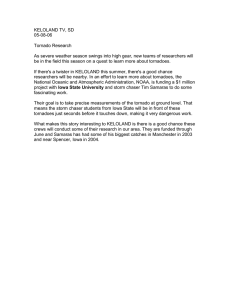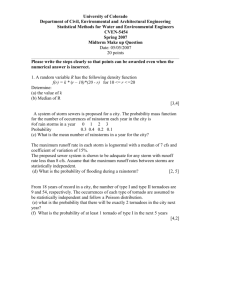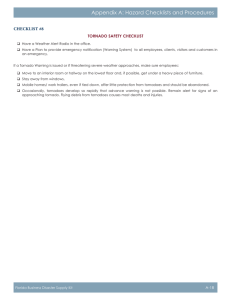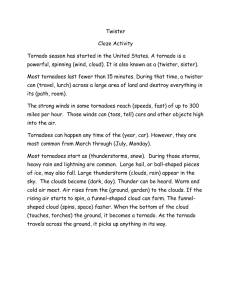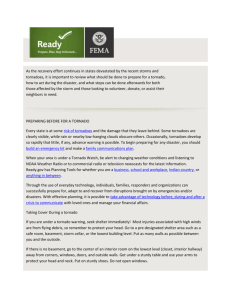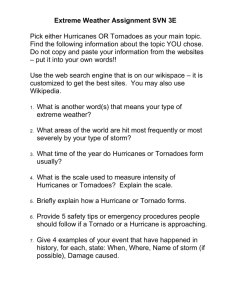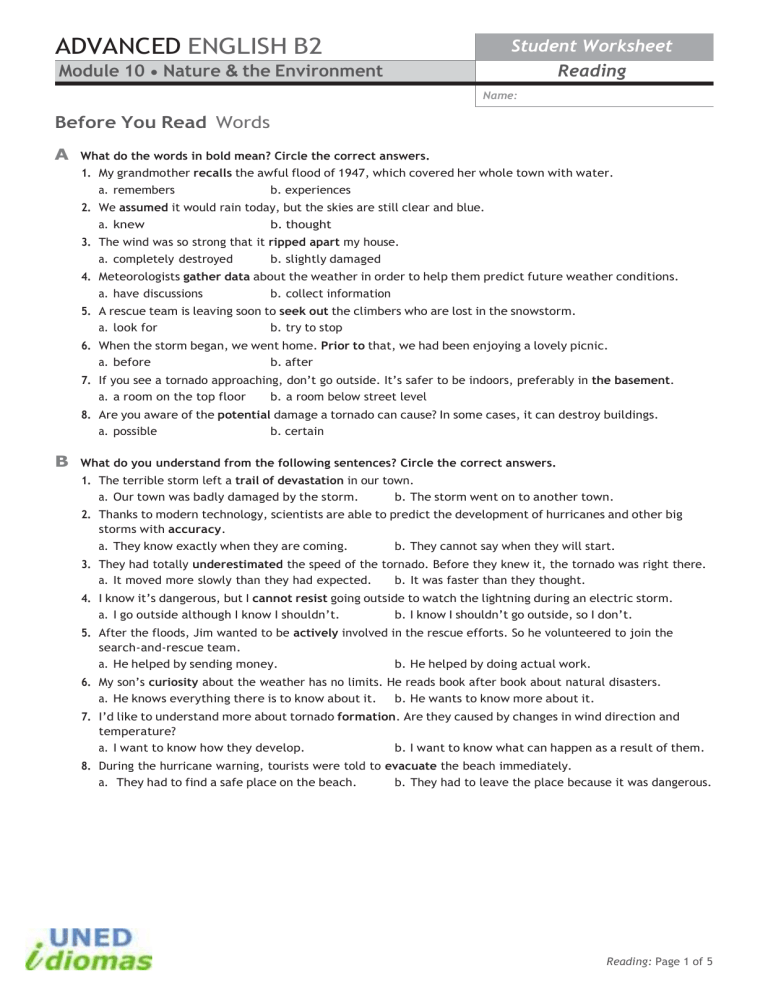
ADVANCED ENGLISH B2 Student Worksheet Module 10 • Nature & the Environment Reading Name: Before You Read Words A What do the words in bold mean? Circle the correct answers. 1. My grandmother recalls the awful flood of 1947, which covered her whole town with water. a. remembers b. experiences 2. We assumed it would rain today, but the skies are still clear and blue. a. knew b. thought 3. The wind was so strong that it ripped apart my house. a. completely destroyed b. slightly damaged 4. Meteorologists gather data about the weather in order to help them predict future weather conditions. a. have discussions b. collect information 5. A rescue team is leaving soon to seek out the climbers who are lost in the snowstorm. a. look for b. try to stop 6. When the storm began, we went home. Prior to that, we had been enjoying a lovely picnic. a. before b. after 7. If you see a tornado approaching, don’t go outside. It’s safer to be indoors, preferably in the basement. a. a room on the top floor b. a room below street level 8. Are you aware of the potential damage a tornado can cause? In some cases, it can destroy buildings. a. possible b. certain B What do you understand from the following sentences? Circle the correct answers. 1. The terrible storm left a trail of devastation in our town. a. Our town was badly damaged by the storm. b. The storm went on to another town. 2. Thanks to modern technology, scientists are able to predict the development of hurricanes and other big storms with accuracy. a. They know exactly when they are coming. b. They cannot say when they will start. 3. They had totally underestimated the speed of the tornado. Before they knew it, the tornado was right there. a. It moved more slowly than they had expected. b. It was faster than they thought. 4. I know it’s dangerous, but I cannot resist going outside to watch the lightning during an electric storm. a. I go outside although I know I shouldn’t. b. I know I shouldn’t go outside, so I don’t. 5. After the floods, Jim wanted to be actively involved in the rescue efforts. So he volunteered to join the search-and-rescue team. a. He helped by sending money. b. He helped by doing actual work. 6. My son’s curiosity about the weather has no limits. He reads book after book about natural disasters. a. He knows everything there is to know about it. b. He wants to know more about it. 7. I’d like to understand more about tornado formation. Are they caused by changes in wind direction and temperature? a. I want to know how they develop. b. I want to know what can happen as a result of them. 8. During the hurricane warning, tourists were told to evacuate the beach immediately. a. They had to find a safe place on the beach. b. They had to leave the place because it was dangerous. Reading: Page 1 of 5 ADVANCED ENGLISH B2 Student Worksheet Module 10 • Nature & the Environment Reading Name: While You Read You are going to read an article about people who chase tornadoes. Six sentences have been removed from the article. Choose from the sentences A-G the one which fits each gap. There is one extra sentence you do not need to use. Storm Chasers If you have ever experienced a tornado, you are unlikely to forget it. It is certainly one of the most powerful natural phenomena on the planet. A tornado consists of a funnel-shaped cloud with gale-force winds that can be twice the speed of the strongest hurricane. It is so strong that when it hits an area, it may leave a trail of devastation in its path, sometimes ripping apart one side of a street while the other remains intact. These storms destroy thousands of homes and in America alone, result in an average of 60 deaths a year. 1 Experts are able to warn people only minutes prior to a tornado strike. Consequently, people living in its path have little time to evacuate. But while most people try to escape these deadly storms or find protection from their potential devastation, there is a small, dedicated group who actively seek them out. These storm chasers think nothing of traveling thousands of miles in search of a twister. 2 This is an area known for the frequency and force of its tornadoes, so people are most likely to witness one there. Considering the danger involved, it is very unusual for women to take up storm chasing. Yet Peggy Willenberg and Melanie Metz, who call themselves the Twister Sisters, have been chasing tornadoes for years. Both women have been fascinated with these thrilling storms since childhood. Peggy recalls that where she grew up in Indiana, tornadoes were frequent. But while her family stayed in the basement to keep out of the storm, she was too curious to stay there and “would sneak out for a look at the action”! Both women have bachelor’s degrees in science and took additional courses in meteorology. 3 However, the combination of a desire for thrills and scientific curiosity makes them unable to resist the attraction of chasing storms. “A tornado is always an enigma,” Willenberg says. She would never assume that she could conquer or control nature. “But,” she continues, “to understand it, that’s almost as powerful.” Apart from catching breathtaking close-up images of the tornadoes on video or camera, storm chasers like Willenberg and Metz also gather data which lead scientists to a better understanding of these freak storms. For instance, researchers have designed a piece of equipment called a probe, which can measure a tornado’s speed and wind direction. But in order for the probe to get information, it has to be inside a tornado. 4 They are the ones who try to place a probe directly in the path of an approaching twister, sometimes putting their own lives at risk. Even if they manage to avoid getting caught in a tornado, chasers face many other dangers in their race to come face to face with these storms. It’s not unheard of for storm chasers to be struck by lightning, skid on rain-soaked roads or get hit by giant hailstones. Added to the risk, storm chasers experience a high level of frustration. 5 They therefore often drive hundreds of miles, only to realize that they should have gone in the opposite direction. Despite the risks, or possibly because of them, an increasing number of thrill-seekers are joining the storm-chasing game. Some even come from Europe to see tornadoes up close. 6 The safest way is to join a tornado-chasing tour run by an experienced company. These tours take tourists for a week of chasing and the lucky ones may witness nature at its most spectacular. They could possibly see a tornado developing right in front of their eyes and have the opportunity to understand the process of tornado formation. GLOSSARY funnel something that has the shape of a cone gale-force winds very strong winds sneak out freak storms unusual storms hailstones pieces of ice falling from the clouds go out quietly so that nobody notices Reading: Page 2 of 5 ADVANCED ENGLISH B2 Student Worksheet Module 10 • Nature & the Environment Reading Name: STRATEGY To understand cause-effect connections: • Look for words such as cause, effect, result and consequence. • Look for words and phrases showing cause-effect connections such as because, result in, so, so … that and to + base form of the verb. A To do this they spend hours driving back and forth across areas where there may be tornadoes, like Tornado Alley, in the Great Plains of the United States. B Worst of all tornadoes, or twisters as they are also called, are nearly impossible to predict with accuracy. C This is carried out using special techniques. D However, professionals like Metz and Willenberg would be the first to warn these amateurs that they should not underestimate the dangers of going it alone. E And this is where storm chasers come in. F With this academic background, they could have chosen a much safer field of research. Sentence F Look for the paragraph giving more information about the women’s academic backgrounds. G Although they use the latest equipment to help them in their search, they cannot always predict the exact location of a twister. Sentence G Look for a paragraph explaining who they refers to and what they do. Sentence B This sentence introduces a cause-effect connection. It is followed by sentences describing what happens as a result of not being able to predict tornadoes. Sentence D The professionals in this sentence are contrasted with amateurs. Look for a paragraph giving more information about amateur storm chasers. Think About It Do you think that the scientific information we can get from storm chasing is worth the risks of the activity? Explain your point of view. Reading: Page 3 of 5 ADVANCED ENGLISH B2 Student Worksheet Module 10 • Nature & the Environment Reading Name: After You Read Words A Similar Different There are different ways to say the same thing. Which pairs of sentences have similar meanings? Which have different meanings? 1. Joe is lucky to be alive after being struck by lightning. Joe was injured during a storm, but fortunately, he was not killed. 2. They predict that the hurricane will hit our town. According to the weather forecast, our town won’t be affected by the hurricane. 3. If researchers want to measure the speed of tornadoes, they use special equipment. Researchers use special equipment to find out exactly how fast tornadoes move. 4. Eating too much sugar can lead to illnesses such as diabetes. Eating too much sugar does not cause diabetes or similar illnesses. 5. If you drive too fast on a wet road, your car can skid and you can have an accident. You can go off the road and have an accident if on a wet road you’re driving too fast. 6. Natural disasters may result in extensive damage and even deaths. Natural disasters can cause extensive damage and even deaths. B Circle the correct answers. 1. When the big dog started to conquer / chase the girl, she ran as fast as she could, screaming for help. 2. My team of builders is extremely dedicated / frustrated – we work long, hard hours because we care about the work we do. 3. The power of nature is terrifying at times – think of how much desire / force a single storm can have! 4. Tornadoes develop so quickly that it is not always easy to find protection / location in a shelter. 5. Teachers need to understand what happens in the brain during the learning process / formation in order to help students when they have difficulty. 6. In the potential / deadly storm that hit the city, over 200 people were killed. 7. The floods caused by the heavy rain destroyed / evacuated many of the valuable paintings in the museum. Word Expansion A WORD BUILDING Complete the chart using words from Storm Chasers. Verb 1 Noun Adjective destruction destructive — 2 accurate protect 3 protective — curiosity 4 5 resistance — 6 assumption — 7 measure / measurement — form 8 — Reading: Page 4 of 5 ADVANCED ENGLISH B2 Student Worksheet Module 10 • Nature & the Environment Reading Name: B Complete the sentences with words from Exercise A. Make any necessary changes. 1. To make the dress, I’ll need to take some – let’s start with the length of the dress. 2. The information about the bus schedule was not 3. Many people show open-minded. , so we missed the bus! to new ideas and it’s difficult to persuade them to be 4. The little boy wanted to know where stars come from and how they are 5. A bomb caused the of this church during World War II. 6. The detective’s 7. Just out of is that the thief climbed in through the bathroom window. , how did you know so much about my research? 8. Paul is extremely C . of his little sister – he never wants her to get hurt. EASILY CONFUSED WORDS Look at how the pairs of easily confused words are used. Words with similar meanings can be confused. Notice how one of the words in a pair is used in Storm Chasers, and how a word with a similar meaning is used in a different context. “… they cannot always predict the exact location of a twister.” (say exactly where it will be) Weather experts have forecast that snow will fall over the weekend. (say what weather to expect) HERE IS A LIST OF COMMONLY CONFUSED WORDS AND THEIR DEFINITIONS: forecast: say what the weather is likely to be predict: say that something will happen in the future force: physical strength or power energy: power to be very active; power from electricity, the sun, etc. last: the one before the present latest: newest, most recent or modern avoid: stay away from a person, place or situation prevent: stop something from happening or someone from doing something measure: find out the size of something count: see how many people or things there are recall: remember something remind: make someone remember (to do) something Complete the sentences by filling in the word or phrase in each pair. forecast predict last latest measure count force energy avoid prevent recall remind 1 a. It was easy to . b. Rain and thunderstorms are how the movie would end – the couple falls in love. for later this afternoon. 2 a. When can we get together? I want to hear all the news. . b. What was the thing your mother told you before she left? 3 a. . b. 4 . a. b. 5 . a. b. 6 . a. You need to Please the size of the sofa to see if it will fit into your living room. the number of guests we’ve invited to the party. I’m so tired that I don’t have the A tornado is a true to go running with you this evening. of nature – a powerful natural phenomenon. Some people dislike exercising and they Working out regularly can help to I can’t b. Please it as much as they can. heart disease and other illnesses. exactly when we met, but we’ve known each other for a long time. the children that they have basketball practice this afternoon. Reading: Page 5 of 5 ADVANCED ENGLISH B2 Student Worksheet Module 10 • Nature & the Environment Grammar 1 Name: Relative Clauses The article Storm Chasers includes many sentences with Relative Clauses. The charts below explain Relative Clauses and include more examples. A Read the explanations and complete the sentences using the correct relative pronouns. Defining Relative Clauses • A defining relative clause identifies or defines the noun it follows. • It begins with a relative pronoun like who, whom (formal), which, that, whose, where and when. • The word that can often replace who, whom, which or when. • The relative pronoun can be left out when it refers to the object of the relative clause. • After superlatives, that usually replaces who or which. 1. Storm chasers are people who 2. They gather information that / / could help scientists. 3. I’ll always remember the day / 4. I talked to several people we first met. homes were destroyed in the storm. 5. It was the most powerful tornado B look for tornadoes. they had ever seen. Read the explanations and complete the sentences using the correct relative pronouns. Non-defining Relative Clauses • A non-defining relative clause provides additional information about the noun before it. • The clause is separated from the rest of the sentence by commas. • The relative pronoun that cannot be used. • The relative pronoun cannot be omitted. • The relative pronoun whom often comes after a preposition. 1. The movie Twister, was made in 1996, is about chasing tornadoes. 2. John Martins, was a famous journalist, reported the event to the media. 3. Professor Halley, to I went for advice, suggested I take an additional math course. 4. Joe and Ann, C children are all now adults, have decided to travel around the world. Read the explanation and complete the sentences using the correct relative pronouns. Additional wh- words Used as Relative Pronouns why / the reason why; what; whoever, whatever, whichever, whenever, wherever, however Note: Wh- words such as whatever and whenever are sometimes used on their own to show that the speaker doesn’t mind what is chosen. 1. You can stop by for coffee 2. Do you know 3. you want. she is so angry? I disliked about our hotel was that it was too far from the beach. 4. Jenny: “Do you want to eat out tonight?” Peter: “ 5. .” the boy goes, his dog always follows him. Grammar: Page 1 of 4 ADVANCED ENGLISH B2 Student Worksheet Module 10 • Nature & the Environment Grammar 1 Name: D1 Complete the sentences with a relative pronoun and the correct form of the verb given. There may be more than one correct answer. 1. Peggy Willenberg and Melanie Metz, have been chasing tornadoes for years. (call) themselves the Twister Sisters, 2. What do you think of the dress (Jackie / buy) at the mall this morning? 3. I will never forget the year thankfully in a safe place. 4. The professor weather conditions. (a hurricane / hit) our neighborhood – we were (lecture / we / hear) yesterday is an expert on extreme 5. What’s the most thrilling experience 6. There is nothing (the kids / like) on this menu – let’s go somewhere else. 7. Harvard University, famous universities in the U.S. 8. Did you read (you / ever / have)? (the conference / take place), is one of the most (I / write) on my blog about amateur storm chasers? D2 Circle the sentences above in which the relative pronoun can be omitted. E Join the sentences using a suitable relative pronoun. The relative pronoun could be a wh- word. There may be more than one correct answer. 1. I have just met a friend. Her husband is a meteorologist. I have just met a friend . 2. It doesn’t matter what the consequences may be. We will stick to our beliefs. we will stick to our beliefs. 3. Where was the tornado? It destroyed a whole town. Where was the tornado F ? 4. We were on vacation in Thailand. We experienced a terrible hurricane there. We were on vacation in Thailand, . 5. Amy Winters spoke at an education conference last year. She is a dedicated teacher. Amy Winters, . Complete the text with the relative pronouns who, which, where, when and whose. Earthquake in L’Aquila The inhabitants of the Italian city of L’Aquila remember April 6, 2009, the day 1 a terrible earthquake hit 2 the area. The earthquake, lasted for 30 seconds, destroyed hundreds of buildings in the historic city and in neighboring villages. The quake was felt 50 miles away in Rome, 3 some ancient ruins were damaged. Within days, rescue workers had set up tents for the thousands of people 4 homes had been destroyed. The 5 people live in the region were grateful for the help they received, but many were also angry. They claimed that for months prior to the earthquake, there had been signs 6 indicated that a powerful earthquake was on the way, yet the authorities had done nothing about it. Grammar: Page 2 of 4 ADVANCED ENGLISH B2 Student Worksheet Module 10 • Nature & the Environment Grammar 2 Name: Adverbs of Probability The article Storm Chasers uses Adverbs of Probability. The chart explains what these are and includes more examples. A Read the explanations and choose the correct answers. Adverbs of Probability show how sure we are of something and how certain or likely it is that an action will occur. • It’s undoubtedly going to be a hot day. It’s only 8 a.m. and the temperatures are already high. = It is certain that it will be hot. • Those clouds look dark and heavy. It will most likely rain this evening. = There is a good chance of rain. • If you join a tornado-chasing tour, perhaps you will see a tornado up close. = There is a possibility you will see one, but you can’t be sure you will. 1. Scientists agree that tornadoes are definitely a powerful natural phenomenon. They are very certain / pretty certain / not certain about this. 2. If you decide to chase a tornado, you could possibly be struck by lightning. It is very certain / pretty certain / not certain that this will happen. 3. I haven’t seen the house that was hit, but the tornado probably caused a lot of damage. It is very certain / pretty certain / not certain that there was a lot of damage. 4. The probe clearly has to be inside the tornado. How could it work otherwise? I am very certain / pretty certain / not certain about this. Adverbs of Probability are used before the main verb (but after an auxiliary verb if there is one) or after the verb be. Maybe and perhaps usually come at the beginning of a clause. Surely at the beginning of a sentence shows that the speaker thinks something is true, but wants others to agree or confirm this. 5. I’m concerned about the approaching storm. Maybe / Possibly we should go down to the basement, just to be safe. 6. You found yourselves directly in the path of a twister? Probably / Surely you were terrified? 7. Tornadoes are common here, so you will perhaps / most likely witness one. 8. The Twister Sisters certainly / maybe love tornadoes – they have been chasing them since childhood. B Circle the correct answer so that the second sentence in each pair has the same meaning as the first. 1. There’s a good chance we’ll go and live in Spain for a year, but it’s not certain. We will possibly / probably / undoubtedly go and live in Spain for a year. 2. I’m very sure that I’m going to spend my birthday on the beach with my friends. I will definitely / perhaps / probably spend my birthday on the beach with my friends. 3. It’s uncertain whether or not we’ll experience a tornado when we visit Kansas. Perhaps / Definitely / Possibly we’ll experience a tornado when we visit Kansas. 4. Jack is pretty certain that he will get the job he interviewed for. Jack will most likely / obviously / maybe get the job he interviewed for. 5. You do understand the dangers of eating so unhealthily, don’t you? Surely / Certainly / Maybe you understand the dangers of eating so unhealthily? Grammar: Page 3 of 4 ADVANCED ENGLISH B2 Student Worksheet Module 10 • Nature & the Environment Grammar 2 Name: Special Structures: so / such, too / enough The article Storm Chasers uses the Special Structures so / such and too / enough. C Complete the sentences with the phrases given. brave enough ■ so quickly ■ too heavily ■ such a cold night ■ so loud ■ enough food ■ so much rain so / such so + adjective / adverb (+ that) 1. Thunder can sometimes be that the noise scares little children. 2. A tornado moves that you may not be able to get out of its path in time. so + many / much / few / little (+ noun) (+ that) 3. There was here last month! The whole countryside is green again. such (+ adjective) + noun (+ that) 4. It was that temperatures dropped to well below freezing. too / enough too + adjective / adverb (+ to + base form of the verb) 5. We couldn’t go outside because the snow was falling . adjective / adverb + enough (+ to + base form of the verb) 6. Are you sure you are to try tornado chasing? enough + noun (+ to + base form of the verb) 7. Because of the severe drought, corn crops haven’t grown and there is not feed everyone. D Complete the sentences with so, such, too or enough. 1. I didn’t realize many houses had been destroyed in the storm. 2. I’m surprised that David looks 3. It was well after his recent illness. an exciting movie that I was sorry when it ended. 4. The best thing about this sport is that you don’t need to learn it. 5. You look tired – did you get much training in order sleep last night? 6. I tried to catch up to you, but you were running 7. We had 8. Kate wasn’t strong 9. Are you sure you have 10. It’s 11. Are you warm E to fast. little time in New York that we didn’t get to see many sights. to lift the heavy table on her own, so she asked for help. experience to manage a store? far to walk into town – let’s call a cab. ? Would you like to borrow my coat? Complete the sentences to make them true for you. 1. I definitely want to . 2. Perhaps I will . 3. Sometimes I am too . 4. I wish I weren’t so . 5. I don’t think I am 6. enough to was such . experience. Grammar: Page 4 of 4 ADVANCED ENGLISH B2 Student Worksheet Module 10 • Nature & the Environment Listening Name: STRATEGY Highlight keywords in the questions and answer choices to help you know what specific information to listen for. An Interview A You will hear an interview about the Iditarod – a special race in extreme weather. Look at the pictures of the participants in the race. What do you know about it? B Listen to the interview and circle the correct answers. 1. The Iditarod takes place A. on Saturday, March 1st. B. every other year. C. at the beginning of March. 2. According to Martin, one of the dangers race participants are likely to face is A. crossing frozen rivers. B. the inability to see. C. the tough competition. TIP Try to answer the questions during the first listening and then check your answers during the second. Don’t leave any questions unanswered. If you’re not sure, guess. 3. Why did Dr. Welch panic? A. He was worried he would get diphtheria. B. There was no medicine for diphtheria in Anchorage. C. He knew more people would die without the medicine. 4. How was the problem of getting the medicine to Nome solved? A. It was sent from town to town by train. B. Bill Shannon met the train and raced all the way to Nome. C. Mushers took turns covering different sections of the route. 5. What did Shannon do to keep his body from getting too cold? A. He tried not to get frostbite. B. He exercised along the way. C. He pushed his dogs to run faster. Question 5 Be careful – both the question and the answer are paraphrased. 6. What saved Kaasen during the storm? A. The lead dog had a good sense of smell. B. He ran so his body wouldn’t freeze. C. He managed to reach a village. 7. Some mushers were upset after the race to Nome because they felt that A. they should have gotten more attention. B. Balto wasn’t worthy of being a star. C. Kaasen didn’t deserve any attention. Question 7 Be careful not to answer too quickly. Make sure you understand the main idea. Listening: Page 1 of 1 ADVANCED ENGLISH B2 Student Worksheet Module 10 • Nature & the Environment Speaking Name: Comparing Pictures A What kind of weather do you like? What do you think some of the challenges are of living in an extremely hot or cold climate? B COMPARING AND SPECULATING Look at pictures A and B. Match each question to an answer. Pay attention to the words in bold. Then practice the dialogue with a partner. TIP Don’t try to describe every detail in the pictures. Just say what’s similar and different. A 1. What do both pictures show? 2. What is different about the pictures? 3. What are the challenges of living in these climates? a. It’s likely that the lack of water is a serious problem in the desert. It’s hard to say, but looking at picture B, I get the impression that the people are exposed to different weather conditions as the seasons change. B b. At first glance, the only thing the pictures have in common is that the people live in tents. c. In contrast to picture B, picture A shows a flat desert area. It’s obvious that there’s really nothing at all similar about the climates. C TOPIC VOCABULARY Look at pictures C and D. Which of the following words and expressions would you use to describe each picture? What other words could you use? C • emergency situation • affect daily life • buried under the snow • cautious about • do damage • have an impact D • predictable • unbearable temperatures • tropical climate • weather patterns D YOUR TASK Compare the two pictures. Say what you think the challenges might be of living in the climates pictured. Use some of the expressions from Exercises B and C. Speaking: Page 1 of 1 ADVANCED ENGLISH B2 Student Worksheet Module 10 • Nature & The Environment Writing Name: A Report A WORKING WITH A MODEL 1. Look at the title of the report. What is the report about? 2. Skim the model report. What are the three suggestions that the writer makes? 3. Which suggestion would you like to adopt? Decreasing the Effects of Global Warming PLAN Introduction 1 Introduction This report is intended to show steps that can be taken in our personal lives to decrease the damaging effects of global warming. Take Action Global warming is caused by air pollution from many factories and power plants. We should support government officials and activist groups that want to pass laws to stop this pollution. Use Green Energy One way to stop global warming is by switching to clean energy sources like solar and wind. These are widely available in our area. Besides reducing the use of polluting fuels like coal and oil, electricity bills will be reduced. Body 2 Drive Less Unfortunately our cars give off almost 20% of the greenhouse gases that cause global warming. Greener options are walking or riding a bicycle. If that’s not practical, taking public transportation or organizing a carpool will lower the number of cars on the road. Conclusion 3 B Conclusion In conclusion, people may feel that there is nothing that can be done to control global warming. However, that is not true. By making changes in our personal lives, we can make a difference. GETTING ORGANIZED The model report is made up of three parts. In the above plan, label (a-c) the part that a. organizes the suggestions into paragraphs with headings. b. sums up the writer’s suggestions. c. says what the report is about. GLOSSARY power plants a building in which electricity for a large area is produced Writing: Page 1 of 2 ADVANCED ENGLISH B2 Student Worksheet Module 10 • Nature & The Environment Writing Name: STRATEGY C To write a good informative report, use headings to organize your ideas and formal language to present them. D IMPROVING YOUR STYLE USING HEADINGS Use headings to help make your report clear and easy to understand. You can often use the points in the task as headings in your report. activist group clean energy source decrease (v) effect (n) global warming 1. Find the headings for the report in the task instructions below. You have been asked to write a report for an environmental studies class about what the average person can do to decrease the effects of global warming. Your report should suggest ways to take action, use green energy and reduce the number of cars on the road. government official pollution (n) public transportation reduce (v) switch (v) True Or FalSe? a. Reducing pollution is a new environmental issue. b. If people switched to clean energy sources, they would save energy and money too. c. Activist groups and government officials are the main cause of global warming. USING FORMAL LANGUAGE When writing a report, we use formal language. For example, it is common to use the passive form in a report. d. In the past few years, we have witnessed the effects of global warming on the world’s climate. 2. Complete the second sentences using the passive form. Top Five Things You Can Do to Reduce Global Warming a. You should share information about recycling and energy conservation with your friends and coworkers. Information about recycling and energy conservation with your friends, neighbors and coworkers. b. Government officials must pass new laws that require people who pollute to pay for the global warming gases that they produce. Laws that require people who pollute to pay for the global warming gases that they produce. c. You can start a carpool with your coworkers to reduce pollution. To reduce pollution, a carpool with your coworkers. d. You should insulate your home to become more energy efficient. Your home to become more energy efficient. e. You must avoid products that come with packaging that can’t be recycled. Products that come with packaging that can’t be recycled . TOPIC VOCABULARY e. Using public transportation can decrease the amount of harmful gases that are emitted into the air. E YOUR TASK Write a report in 140-190 words. Use the useful expressions to help you. A committee has been appointed at your college to study the effects of global warming on our personal lifestyles. You have been asked to write a report for the committee. Your report should: ❉ suggest ways to reduce pollution. ❉ s uggest ways to use renewable energy and recycle. Write your report. USEFUL EXPRESSIONS Another possibility is to … The aim / purpose of this report is to … The report contains … The report is intended to … CHECKLIST 1. I followed the plan. 4. I used appropriate vocabulary. 2. I wrote headings. 5. I checked my spelling and grammar. 3. I used formal language. 6. I wrote a report suggesting ways to minimize the effects of global warming. Writing: Page 2 of 2 ADVANCED ENGLISH B2 Student Worksheet Module 10 • Nature & the Environment Assessing Your Learning Name: A Check (✓) whether you know the meanings of the words and phrases you learned in this module. Use a dictionary to find the meanings of words and phrases you still don’t know. READING SPEAKING WORDS AND EXPRESSIONS FROM THE TEXT actively (adv) lead to (phr v) At first glance, … basement (n) potential (adj) have in common chase (v) prior to In contrast … conquer (v) process (n) It’s hard to say, but … deadly (adv) recall (v) It’s likely that … dedicated (adj) result in It’s obvious that … desire (n) rip apart nothing at all destroy (v) seek out (phr v) evacuate (v) skid (v) force (n) struck by lightning gather data trail of devastation hit (v) underestimate (v) TOPIC VOCABULARY affect daily life buried under the snow cautious about do damage WORD EXPANSION emergency situation Word Building have an impact Verb Noun Adjective --- accuracy accurate assume assumption --- --- curiosity curious destroy destruction destructive form form / formation --- measure measure / measurement --- protect protection protective resist resistance --- Easily Confused Words B COMPARING AND SPECULATING predictable (adj) tropical climate unbearable temperatures weather patterns WRITING TOPIC VOCABULARY activist group government official clean energy source pollution (n) decrease (v) public transportation effect (n) reduce (v) global warming switch (v) USEFUL EXPRESSIONS forecast (v) measure (v) avoid (v) predict (v) count (v) prevent (v) last (adj) force (n) recall (v) The report contains … latest (adj) energy (n) remind (v) This report is intended to … Another possibility is to … The aim / purpose of this report is to … These are the grammar topics you learned in this module. Check (✓) those you feel you know well and those you need to practice more. RELATIVE CLAUSES know well need to practice ADVERBS OF PROBABILITY; SPECIAL STRUCTURES: so / such, too / enough know well need to practice For further practice, go to the Grammar Index. Assessing Your Learning: Page 1 of 1
